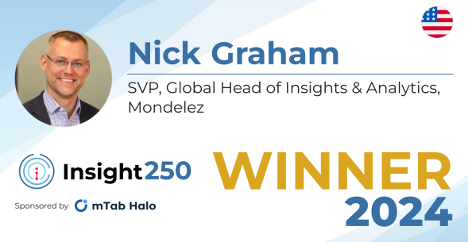Reinventing Insights
Nick Graham, Previously Global Head of Insights & Analytics, Mondelez and Since July 2024 Founder of Vertemis). Vertemis helps organizations transform how they use insights & analytics to drive better decision-making and elevate business impact.

The Insight250 spotlights and celebrates 250 of the world’s premier leaders and innovators in market research, consumer insights, and data-driven marketing. The awards have created renewed excitement across the industry whilst strengthening the connectivity of the market research community. Winners of the 2024 Insight250 were announced this past September - you can see the full list of Winners at Insight250.com. The 2025 award winners are in the process of being selected now.
With so many exceptional professionals named to the Insight250 we regularly tap into their expertise and unique perspectives across various topics. This regular series does just that: inquiring about the expert perspectives of many of these individuals in a series of short topical features.
With technology advancing at an incredible pace and the value of insights ever increasing, I sat down with Insight250 Winner Nick Graham, who when he won in 2024 was Global Head of Insights & Analytics for Mondelez to discuss this evolution and the need to reinvent insights to enhance its impact and elevate its efficacy. In July 2024, Nick founded Vertemis. Vertemis helps organizations transform how they use insights & analytics to drive better decision-making and elevate business impact. In this feature, Nick goes into great depth on a number of insightful topics I am sure you will find fascinating and useful.
Crispin: Nick you’ve worked in London, NYC and now Portugal, do views around the importance of insights differ around the globe?
NG: In my opinion, the fundamentals of insights are universal. Wherever you find yourself, insights is always about deeply understanding behavior, finding a friction point that reveals an opportunity, and then using that to design an intervention that shapes future behavior. The need for insights – or indeed what something a “good” insight” – is remarkably consistent around the world. But the expectations around insights do differ slightly. In the US and some parts of Asia, I’ve found that there’s a stronger expectation for speed and commercial actionability. Whereas, in Europe and parts of Latin America, I feel like strategic depth and intellectual rigor is prized a little more. That’s not to say that any of these markets value one thing and not the other, it’s just a subtle difference in focus and how insight professionals are expected to show up.
Crispin: You spent over a decade at major brands such as Mondelez and PepsiCo. How critical is customer insight for global brands in today’s market? Where do insights add most value?
NG: In my mind, Insights are more critical than ever. These days, we’re increasingly operating in a highly volatile and hyper fragmented world that’s drowning in data. In that environment, it’s never been more important to be able to rise above the noise and break free of the blinkers of your current worldview. And to do that requires forward-looking, consumer-centric thinking. To be clear, I think Insights have always mattered, but increasingly I think they’re becoming a source of competitive advantage. The real value comes when insights help frame the growth agenda for businesses, guiding them on what to do next and how to prepare for the future. That’s when insights stop being a mirror and become a compass.
Crispin: Is using insights to drive commercial decisions increasing or decreasing in the sector, and why do you think that is happening?
NG: From my perspective, it’s increasing – but so are the expectations of our stakeholders. More and more companies are recognizing that they can’t build strategy without insight at the core. But they also expect those insights to be real-time, actionable, commercially grounded and guide forward-looking action. It’s not enough to explain what happened and why, the expectation is that insight actively helps shape what happens next.
Crispin: What do you see as the key challenges facing insights professionals in 2025?
NG: To me, there are three big challenges facing insights professionals right now: redefining our organizational role in a world of democratized data, DIY research and AI; tackling time poverty and data overload by being razor-sharp about where we focus our time and what we delegate, automate or stop; equipping our teams with the future-fit skills – both technical and leadership – required to effectively drive change.
Crispin: How do brands like Mondelez use AI in the insights process?
NG: First and foremost – before we started experimenting with AI, we worked with our stakeholders and cross-functional partners to build a clear strategy, rooted in specific business use cases. Through this, we broadly identified three big “jobs to be done” for AI within insights
Streamline: automate existing tasks & processes to free up time, money and mental bandwidth, e.g. coding open ends, summarizing transcripts, drafting discussion guides, or auto-generating dashboards.
Surface: uncover hidden patterns, insights and opportunity areas across datasets to help us more effectively, e.g. identifying unmet needs via social/search data or mining our knowledge estate to create new innovation platforms.
Simulate: anticipate how consumers or categories might respond, enabling us to augment research, plan and iterate in real time, e.g. modeling future scenarios or predict responses to creative or innovation ideas,
Crispin: Can you provide an example of a key insight that fundamentally changed a product decision or marketing strategy at Mondelez? How do you ensure such insights are effectively communicated and implemented across various departments?
NG: One example that has really stuck with me is a deprivation study we did with high-frequency chewing gum users. We asked them to stop chewing for one week and replace it with something else. The biggest “aha” wasn’t about refreshment, taste or even habit, it was psychological. People felt more stressed, less focused without the act of chewing. Nothing else they used delivered the same mental release. That insight aligned with something R&D had observed about the impact of chewing. It caused us to completely rethink how we talked about the category and shifted our innovation pipeline to focus more on mental benefits, not just refreshment or flavor. But we didn’t stop at the debrief, the team worked to bring it to life for our stakeholders – using immersive, experiential storytelling to make them “feel” the insight, not just hear it. While the insight itself was powerful and surprising, it was how we activated it that made it stick.
Crispin: You’ve talked in the past about insights needing to “reinvent.” What do you mean by that and what does the profession need to do?
NG: In short, we need to fundamentally rethink our role. A lot of what we used to pride ourselves on – the craft of research, analytics and synthesis – is increasingly being automated, delegated or democratized. In a world of dashboards, DIY tools, and GenAI chatbots, we can’t define ourselves just by what we do. We have to define ourselves by what we deliver.
That means shifting from seeing ourselves as consumer research experts to seeing ourselves as consumer-centric strategic co-pilots. Our value lies not in the research itself, but in helping the business drive smarter, faster, more consumer-centric decisions that unlock growth. Reinvention doesn’t mean abandoning the craft and rigor of research, but it means evolving how and where we apply our efforts to drive impact.
HOT TOPIC: Overcoming industry-wide challenges to deliver results.
Crispin: In a post COVID world, many teams have reduced resources yet need to achieve more. Often marketing teams and others are hungry for data and attempt to conduct research or analyse data independently - sometimes misinterpreting or incorrectly analysing data. Others are faced with growing and siloed data sets, tools that are no longer fit for purpose - we are in a world where insights and evidence are more important yet results are needed more quickly. Taking each of these four areas below, how do leading global brands tackle these challenges?
(a) Overcoming Research Team Resource Constraints and Disconnected Tools: How do we address the challenges posed by limited research team resources and the use of disconnected analysis and reporting tools that can create delays or inefficiencies in obtaining insights?
NG: In my experience, high-performing insights teams are ruthless in how they prioritize their time. They automate lower-value, manual tasks, say no to projects that lack clear business impact, and design everything – research, analysis, tools, dashboards – around how the business actually makes decisions. Too often, teams get stretched thin on projects that aren’t anchored to a clear business action – or don’t deliver in time to influence it. We need to be tougher with ourselves and with stakeholders. Instead of working “brief forward,” we need to work “decision back.” That shift in mindset changes everything: it sharpens focus, improves speed, and ensures insights are actually used.
Crispin: (b) Overcoming Siloed Survey Data: What strategies or technologies do we employ to integrate siloed survey data, ensuring that valuable insights are not missed and can be leveraged effectively across different departments?
NG: There’s no doubt that AI can play a big role here. A lot of corporate-side Insights teams are exploring layering AI over their knowledge estate to help everyone – not just the Insights team – mine data, synthesize findings, sharpen briefs and avoid duplication. But technology alone isn’t enough. You need the right mindset and processes to sustainably change behavior. A great example from my time at Mondelez was when the Europe team adopted the “look before you leap” rule. No new work could be commissioned until our existing knowledge had been mined and synthesized. This reduced unnecessary duplication and ensured that we focused fresh work on the real knowledge gaps.
Crispin: (c) Addressing Limitations of Dashboards and Complex Survey Analysis Tools: How do we overcome the challenges posed by high-level dashboards and complex survey analysis tools that restrict the ability to obtain deep insights quickly and independently?
NG: In my experience, most dashboards and automated reports were built for inspection, not action. They aggregate the “what,” but rarely help clarify the “so what.” The most effective teams flip this on its head - designing dashboards around the decisions they’re meant to drive. That means dynamic interfaces, clear data hierarchies, and curated views that link key drivers to desired outcomes. So instead of overwhelming users with a data dump, you deliver exactly what they need to make a decision. This is one place where GenAI chatbots will make a huge impact, giving stakeholders the ability to interrogate data, ask follow-up questions, and even simulate different scenarios in a more interactive and decision-driven way.
Crispin: (d) Managing Data and Insights Enterprise-Wide: How do we manage data and insights enterprise-wide to ensure that teams have access to accurate information misuse or misinterpretation of the data?
NG: This is one of the big paradoxes that Insights teams are grappling with right now. If we want to democratize data and build a truly consumer-centric culture, we have to loosen our grip. But that inevitably comes with the risk of misuse or misinterpretation. In my experience, the answer isn’t to hold on tighter; it’s to embed governance into the systems we’re creating. That means building in automated safeguards: warnings, thresholds, compliance flags and “go/no-go” indicators baked directly into the platform. I’m optimistic that AI can play a huge role here – think dashboards that auto-flag risks, platforms that generate compliance summaries or tools that guide users through making a data-driven decision. This shift allows Insights to move from overwhelmed gatekeeper to governance architect.
TOP TIP
What’s your top tip to be a leader and innovator in our profession?
NG: In short, it’s not about how “true” your insight is, it’s about how much traction you can create for it. And to get traction, you need to understand the business problem as much as the consumer one. The best Insights leaders don’t just obsess over data quality and methodology, they obsess over the business brief and landing the insights into action.
Crispin: Nick, thank you for sharing your insightful perspective on how insights have to reinvent themselves to keep pace and provide value on an ongoing basis and technology advances. It’s exciting to hear about your deep and diverse experience and how it has provided you with such a unique perspective on the evolving role of insights.

Crispin Beale
Chairman at QuMind, CEO at Insight250, Senior Strategic Advisor at mTab, CEO at IDXCrispin Beale is a marketing, data and customer experience expert. Crispin spent over a decade on the Executive Management Board of Chime Communications as Group CEO of leading brands such as Opinion Leader, Brand Democracy, Facts International and Watermelon. Prior to this Crispin held senior marketing and insight roles at BT, Royal Mail Group and Dixons. Crispin originally qualified as a chartered accountant and moved into management consultancy with Coopers & Lybrand (PwC). Crispin has been a Board Director (and Chairman) of the MRS for nearly 20 years and UK ESOMAR Representative for c15 years. As well as being CEO of Insight250, Crispin is currently Worldwide CEO of Digital Communications Solution Agency, IDX. Crispin is also the Senior Strategic Advisor at mTab and the Chairman of QuMind and spent 4 years as Group President of Behaviorally where he was responsibile for the client & commercial teams globally. Crispin is a passionate advocate for blending human intelligence and technology to deliver innovation and leadership across organisations.


